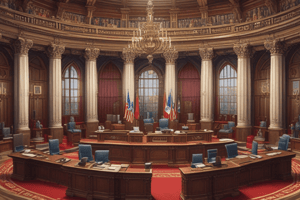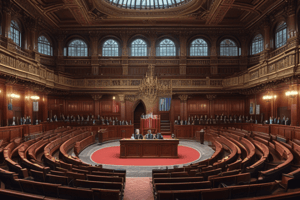Podcast
Questions and Answers
¿Cuál es la duración de las sesiones ordinarias del Congreso según la Constitución?
¿Cuál es la duración de las sesiones ordinarias del Congreso según la Constitución?
- Del 1° de abril al 31 de octubre
- Del 1° de marzo al 30 de noviembre (correct)
- Del 1° de febrero al 31 de diciembre
- Del 1° de enero al 30 de junio
¿Qué tipo de sesiones del Congreso pueden ser convocadas únicamente por el presidente de la Nación?
¿Qué tipo de sesiones del Congreso pueden ser convocadas únicamente por el presidente de la Nación?
- Sesiones preparatorias
- Sesiones extraordinarias (correct)
- Sesiones de prórroga
- Sesiones ordinarias
¿Qué tipo de sesiones no está previsto en la Constitución, sino en los reglamentos internos de cada Cámara?
¿Qué tipo de sesiones no está previsto en la Constitución, sino en los reglamentos internos de cada Cámara?
- Sesiones preparatorias (correct)
- Sesiones de prórroga
- Sesiones ordinarias
- Sesiones automáticas
¿Qué se debate en las sesiones ordinarias del Congreso?
¿Qué se debate en las sesiones ordinarias del Congreso?
¿Cómo se autoconvocan las Cámaras del Congreso para las sesiones ordinarias?
¿Cómo se autoconvocan las Cámaras del Congreso para las sesiones ordinarias?
¿Qué se necesita para que una sesión del Congreso sea considerada válida?
¿Qué se necesita para que una sesión del Congreso sea considerada válida?
¿Qué puede hacer el Congreso durante las sesiones de prórroga?
¿Qué puede hacer el Congreso durante las sesiones de prórroga?
¿Qué objetivo tienen las sesiones preparatorias en el Congreso?
¿Qué objetivo tienen las sesiones preparatorias en el Congreso?
¿Cuál de las siguientes atribuciones corresponde a la Cámara de Diputados?
¿Cuál de las siguientes atribuciones corresponde a la Cámara de Diputados?
¿Cuáles son las funciones principales de las comisiones en el Congreso?
¿Cuáles son las funciones principales de las comisiones en el Congreso?
¿Cómo se eligen los diputados en Argentina según la Constitución?
¿Cómo se eligen los diputados en Argentina según la Constitución?
¿Qué se entiende por organización de bloques en el Congreso?
¿Qué se entiende por organización de bloques en el Congreso?
¿Qué límite establece la Constitución sobre el número de diputados por provincia?
¿Qué límite establece la Constitución sobre el número de diputados por provincia?
¿Qué autoridad no tiene el presidente de la Cámara de Diputados?
¿Qué autoridad no tiene el presidente de la Cámara de Diputados?
¿Cuál es un deber del Congreso en relación con leyes y reglamentos?
¿Cuál es un deber del Congreso en relación con leyes y reglamentos?
¿Cuál de las siguientes opciones describe mejor la elección directa de diputados?
¿Cuál de las siguientes opciones describe mejor la elección directa de diputados?
¿Cuál es la composición del Congreso de la Nación?
¿Cuál es la composición del Congreso de la Nación?
¿Qué atribución específica tiene la Cámara de Diputados?
¿Qué atribución específica tiene la Cámara de Diputados?
¿Cuál de las siguientes afirmaciones es correcta respecto al sistema electoral argentino?
¿Cuál de las siguientes afirmaciones es correcta respecto al sistema electoral argentino?
¿Cómo se organizan generalmente los bloques parlamentarios en el Congreso?
¿Cómo se organizan generalmente los bloques parlamentarios en el Congreso?
¿Qué tipo de quorum se requiere en la Cámara de Diputados para sesionar?
¿Qué tipo de quorum se requiere en la Cámara de Diputados para sesionar?
¿Cuál de las siguientes leyes no es responsabilidad del Congreso?
¿Cuál de las siguientes leyes no es responsabilidad del Congreso?
¿Qué organismo ejerce el control recíproco entre los poderes del Estado?
¿Qué organismo ejerce el control recíproco entre los poderes del Estado?
¿Qué se entiende por 'hábbeas data' en el contexto de la Constitución?
¿Qué se entiende por 'hábbeas data' en el contexto de la Constitución?
¿Cuál es una de las funciones del Poder Judicial mencionado en la Constitución?
¿Cuál es una de las funciones del Poder Judicial mencionado en la Constitución?
Flashcards
Quórum
Quórum
La cantidad mínima de miembros presentes en una sesión para que ésta sea válida.
Mayoría Absoluta
Mayoría Absoluta
La mitad más uno de los miembros presentes en una asamblea.
Cámara de Diputados
Cámara de Diputados
Representa a la población en el Congreso Argentino.
Representación Proporcional (Diputados)
Representación Proporcional (Diputados)
Signup and view all the flashcards
Elección Directa (Diputados)
Elección Directa (Diputados)
Signup and view all the flashcards
Simple Pluralidad
Simple Pluralidad
Signup and view all the flashcards
Atribuciones del Congreso (Económicas)
Atribuciones del Congreso (Económicas)
Signup and view all the flashcards
Atribuciones del Congreso (Legislativas)
Atribuciones del Congreso (Legislativas)
Signup and view all the flashcards
Sesiones Ordinarias del Congreso
Sesiones Ordinarias del Congreso
Signup and view all the flashcards
Sesiones Extraordinarias del Congreso
Sesiones Extraordinarias del Congreso
Signup and view all the flashcards
Sesiones de Prórroga del Congreso
Sesiones de Prórroga del Congreso
Signup and view all the flashcards
Sesiones Preparatorias del Congreso
Sesiones Preparatorias del Congreso
Signup and view all the flashcards
Comisiones del Congreso
Comisiones del Congreso
Signup and view all the flashcards
Artículo 63 de la Constitución
Artículo 63 de la Constitución
Signup and view all the flashcards
Duración de las sesiones ordinarias
Duración de las sesiones ordinarias
Signup and view all the flashcards
Facultad convocador Sesiones Extraordinarias
Facultad convocador Sesiones Extraordinarias
Signup and view all the flashcards
Hábeas Data
Hábeas Data
Signup and view all the flashcards
División de Poderes
División de Poderes
Signup and view all the flashcards
Poder Legislativo
Poder Legislativo
Signup and view all the flashcards
Congreso Nacional
Congreso Nacional
Signup and view all the flashcards
Poderes extraconstitucionales
Poderes extraconstitucionales
Signup and view all the flashcards
Poder Ejecutivo
Poder Ejecutivo
Signup and view all the flashcards
Poder Judicial
Poder Judicial
Signup and view all the flashcards
Sistema Bicameral
Sistema Bicameral
Signup and view all the flashcards
Study Notes
Estado de Derecho Argentino - Unidad 6
-
Formas de gobierno: Refers to how the state is organized, distributing structures and powers among its organs. It encompasses the governmental structure, those wielding power, and is a key component of the state.
-
Classification - Parliamentary: Roots in 18th and 19th-century British constitutional practice. Features an interconnected balance between the legislative and executive branches. Key characteristics include: executive actions subordinate to legislative direction, dual executive structure (a politically-irresponsible head of state and a collective cabinet), and parliamentary accountability of the cabinet. A vote of no confidence empowers the legislature to dismiss and replace the cabinet. The head of state remains stable, ensuring government continuity.
-
Classification - Presidential: Focuses on the executive branch. The president holds both head of state and head of government roles. There is clear separation but not absolute separation of powers among executive, legislative, and judicial branches. The president is directly or indirectly elected by the populace and alone bears responsibility for executive functions.
-
Form of Argentine Government: Argentina’s governmental framework is representative, republican, and federal.
-
Political Parties:
- Emerged in the 19th century to reflect diverse political viewpoints.
- Functions include channeling public will, preventing political apathy, promoting public education, and acting as middlemen between the public and government.
-
Suffrage: Is the essential method for exercising popular sovereignty, allowing citizens to directly or indirectly choose government authorities.
- Suffrage types: Universal, Restricted or Qualified, Public, Secret, Compulsory/Optional, Direct, and Indirect.
-
Republican Government: Argentina's government structure is based on principles of equality and popular sovereignty. There is a separation of powers (executive, legislative, and judicial). Government officials have limited terms and are accountable to the people.
-
Division of Powers: Separates powers among the legislative, executive, and judicial branches. This division prevents any one branch from gaining undue power. It does allow some overlap for coordination and balance.
-
Judicial Power: Independent judiciary, integrated by judges and officials dedicated to fair and impartial justice. The powers include administering justice for federal and provincial areas. Court systems include the Supreme Court, lower courts, etc..
-
Individual Rights and Guarantees: The Argentine Constitution safeguards individual rights (civil, political, economic, social, and cultural) stemming from fundamental human dignity. Constitutional rights include freedoms of expression, assembly, the press; prohibition of torture; and rights to due process and fair trials.
-
Social Rights: Encompasses rights related to work, such as fair and equal conditions, limited hours, paid leave, and fair wages.
-
Consumer Rights: Protecting consumers and users is enshrined in the Constitution (art 42) with a focus on health and safety, and information.
-
Environmental Concerns: There is recognition in the constitution (art 41) of the need to balance development with environmental protection..
Studying That Suits You
Use AI to generate personalized quizzes and flashcards to suit your learning preferences.




